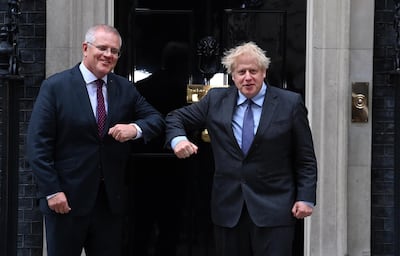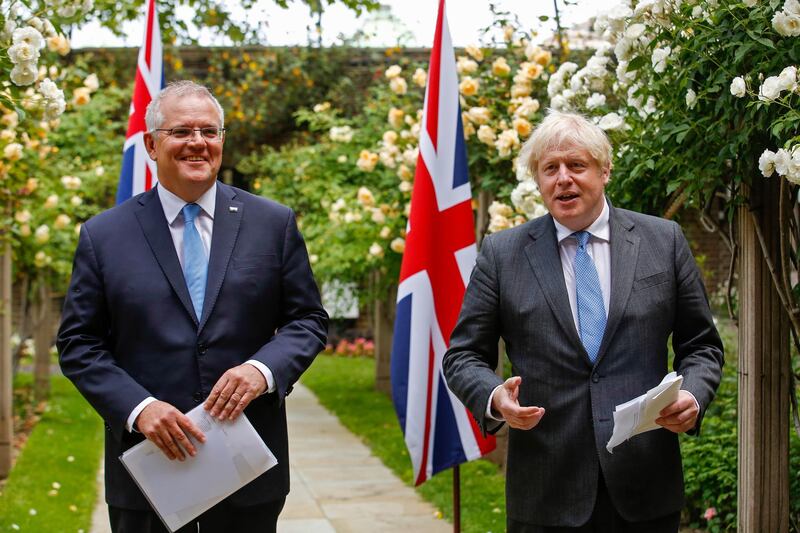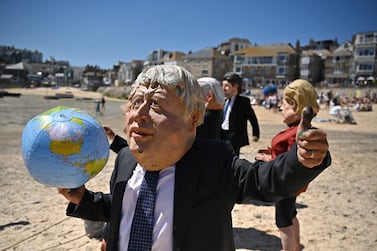Britain and Australia have agreed on broad terms of a new free trade deal after talks between their prime ministers cleared up outstanding issues.
Boris Johnson and Scott Morrison overcame the sticking points over a three-hour dinner at No 10 Downing Street on Monday night.
The deal is Britain's first to be negotiated from scratch since the leaving the EU and could be a step towards creating a wider trade deal in the Asia-Pacific region.
It is expected to give UK and Australian food producers and other businesses easier access to each other's markets.
UK ministers said British-made cars and food and drink would be cheaper to sell in Australia, while working visa restrictions for under-35s would be loosened.
Mr Johnson welcomed the agreement as a "new dawn" in the UK's relationship with Australia.
“Our new free-trade agreement opens fantastic opportunities for British businesses and consumers, as well as young people wanting the chance to work and live on the other side of the world," he said.
“This is global Britain at its best – looking outwards and striking deals that deepen our alliances and help ensure every part of the country builds back better from the pandemic.”
DEAL 🇬🇧🇦🇺: Prime Minister @BorisJohnson agreed a UK-Australia free trade deal with Australian PM @ScottMorrisonMP in Downing Street this morning.
— UK Prime Minister (@10DowningStreet) June 15, 2021
Read more about this historic deal: https://t.co/Q1PN7QrOox pic.twitter.com/6CKt1VsPNy
Trade Secretary Liz Truss said the deal would eliminate tariffs and red tape for more than 13,000 UK businesses seeking to operate in Australia.
"It is a fundamentally liberalising agreement that removes tariffs on all British goods, opens new opportunities for our services providers and tech firms, and makes it easier for our people to travel and work together," she said.
Australian Trade Minister Dan Tehan confirmed the leaders agreed on terms of the deal in London.
“Both prime ministers have held a positive meeting in London overnight and have resolved outstanding issues in relation to the free trade agreement,” he said.
“Their agreement is a win for jobs, businesses, free trade and highlights what two liberal democracies can achieve while working together.”
The deal will be scrutinised by British farmers, who were concerned about a compromise on food standards, while some feared Australian beef and lamb could undercut UK farmers on price, forcing them out of business.
The government said British farmers would be protected by a cap on tariff-free imports for 15 years.
Robin Traquair, vice president of the National Farmers Union Scotland, said the Australian agricultural deal could be the first of many.
"We're going to have a Pacific deal, we're going to have a New Zealand deal, there could be an American deal, there could be a Brazil deal," he told BBC's Radio 4 Today programme on Tuesday.
“We just don’t know how we’re going to trade ... how much product will come into the country and at what price. A lot of farmers are worried.”

Dmitry Grozoubinski, a former Australian trade negotiator, said it appeared the Australian side won more concessions than the British.
"Access to the agricultural market is our north star. As Australian trade negotiators, it is our prime directive," he said.
"You can’t get much better than full access, and I do say there is some champagne being popped in Canberra today."
He downplayed the threat posed by Australian produce, suggesting British farmers "should be far more concerned about what comes next" and the "precedent this establishes for future trade deals".
But Cabinet Office minister Michael Gove, who was reported to have raised concerns about the deal, said British farmers now had more opportunity to sell their produce in countries outside the EU.
“We support farmers and we do so by making sure we give them an opportunity to export their fantastic produce on the world stage,” he told Sky News.
“Opening up new markets for them worldwide is the way to make sure we can not only keep our farmers successful but also ensure we have investment in the countryside.”
Official estimates suggest the agreement could add £500 million ($705.7m) to British economic output.
Mr Tehan said Australia was looking forward to conducting more trade with Britain, and that Australian beef and lamb exports, which were previously limited by import quotas, accounted for only 4.3 per cent of British consumption.
“British consumers are missing out on choosing high-quality, well-priced Australian products,” he said.
“What’s more, they’re missing out on eating the best lamb chops and the best steak in the world.”
He said Australia "felt that a special bond was being broken” when Britain joined the European Common Market in 1973.
“Half a century on, Australia stands ready again to be a willing partner with the UK,” he said.







